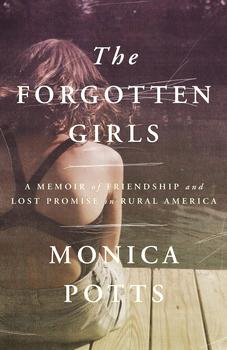Summary | Excerpt | Reviews | Beyond the Book | Readalikes | Genres & Themes | Author Bio

A Memoir of Friendship and Lost Promise in Rural America
by Monica Potts
Words like malaise and despair hint at stories that can't be told with data and statistics. This, I felt, was where the work of sociologists and economists and public health experts ended and my work as a journalist began. The kinds of deaths the researchers had noticed were increasing more for some people than for others, and in some places more than in others. So I decided to return to my Ozark hometown, with its aging, shrinking population, governed by a small group of people who worshipped at the same churches as their parents and who had knit around themselves an ever thicker and tighter web of personal and political self-deceits.
Even as the Covid-19 pandemic hit, these long-term trends continued. When the virus first arrived in the United States, it affected people in the Northeast and people of color the hardest. Mortality spiked by 23 percent overall: white Americans lost an average of 1.36 years of life, Black Americans lost 3.25 years, and Latinos lost 3.88 years. Once vaccines became universally available, however, the death rates for many groups dropped. But for middle-aged, white Americans in rural areas like my hometown, they rose. In the last half of 2021, this was attributable largely to persistent vaccine hesitancy, especially among white evangelical Republicans, which the Public Religion Research Institute found to be the most vaccine-hesitant group in the country. Even into 2022,
They looked at a slightly differently population, which included some high school graduates who hadn't gone on to college, and found a slightly smaller three- year decline in life expectancy for white women in this group
less than half of the population of Clinton was fully vaccinated. And as the Delta and Omicron variants spread, people died despite the availability of free vaccines that could have saved nearly all of them. Still raging, underneath the virus, were the opioid and meth epidemics, made worse by the isolation and uncertainty wrought by the pandemic, and from the rise of fentanyl, a more deadly synthetic opioid that replaced drugs like OxyContin and heroin in the illegal supply because it was cheaper and easier to obtain.
When I started looking into why less educated, rural white women were dying and what was killing them, I thought my investigation would be straightforward. Study after study had offered answers: methamphetamines, opiates, suicide, and smoking. And yet each of these taken alone was unsatisfactory. Why did a drug like meth take over in some places but not others? Why would prescription painkillers, which are available everywhere, kill poor, uneducated white people in greater numbers than other groups? Why did the rate of suicide rise and spread in rural areas faster than elsewhere? Why did some women persist in smoking even though everyone knows it's disastrous to health? None of these questions had simple answers, but trying to answer all of them would take me past research and into the circumstances, accidents, and personal choices that fill and shape our lives.
I thought I was looking for the women most affected by these changes, those most in danger of dying: What was different about their lives and why? It turned out, though, that I was looking for only one person.
For many years, I had avoided Darci on purpose. When I'd left home at eighteen, she'd been kicked out of high school weeks before graduation, or at least that was how I'd remembered it. Before I left for college, we'd said goodbye at a funeral, a painful capstone to an often painful childhood. I was eager to leave, to close the book on Clinton and the people in it. Thereafter, as I built my life elsewhere, I tried not to think about what I'd left behind, what life was like for the people I loved. I sensed, from little things I heard, that Darci's life had not gone as she'd hoped. When I finally did go back, I realized that my investigation would turn on all the questions science couldn't answer, on what my best friend's life had been like after I'd left, and on how she'd ended up in that trailer on top of the mountain.
* * *
When we reconnected in April 2015, Darci had insisted on taking a photo. It shows us with our arms around each other, leaning in. I'm smiling big, wearing lipstick, in a summer dress and light jacket, and looking confidently into the camera. Darci is wearing her flowy, floral clothes with headbands pulling back her hair, and she grins the easy smile of someone who loves to have her photo taken. In the years that followed, she insisted on taking a picture of us nearly every time we met. Over the years, my smiles fade until they're nonexistent, and we hold each other a little less close each time. The pictures become less frequent, because Darci was fading away from me again.
From the book The Forgotten Girls: A Memoir of Friendship and Lost Promise in Rural America by Monica Potts. Copyright © 2023 by Monica Potts. Published by Random House, an imprint and division of Penguin Random House LLC. All rights reserved.




The dirtiest book of all is the expurgated book
Click Here to find out who said this, as well as discovering other famous literary quotes!
Your guide toexceptional books
BookBrowse seeks out and recommends the best in contemporary fiction and nonfiction—books that not only engage and entertain but also deepen our understanding of ourselves and the world around us.